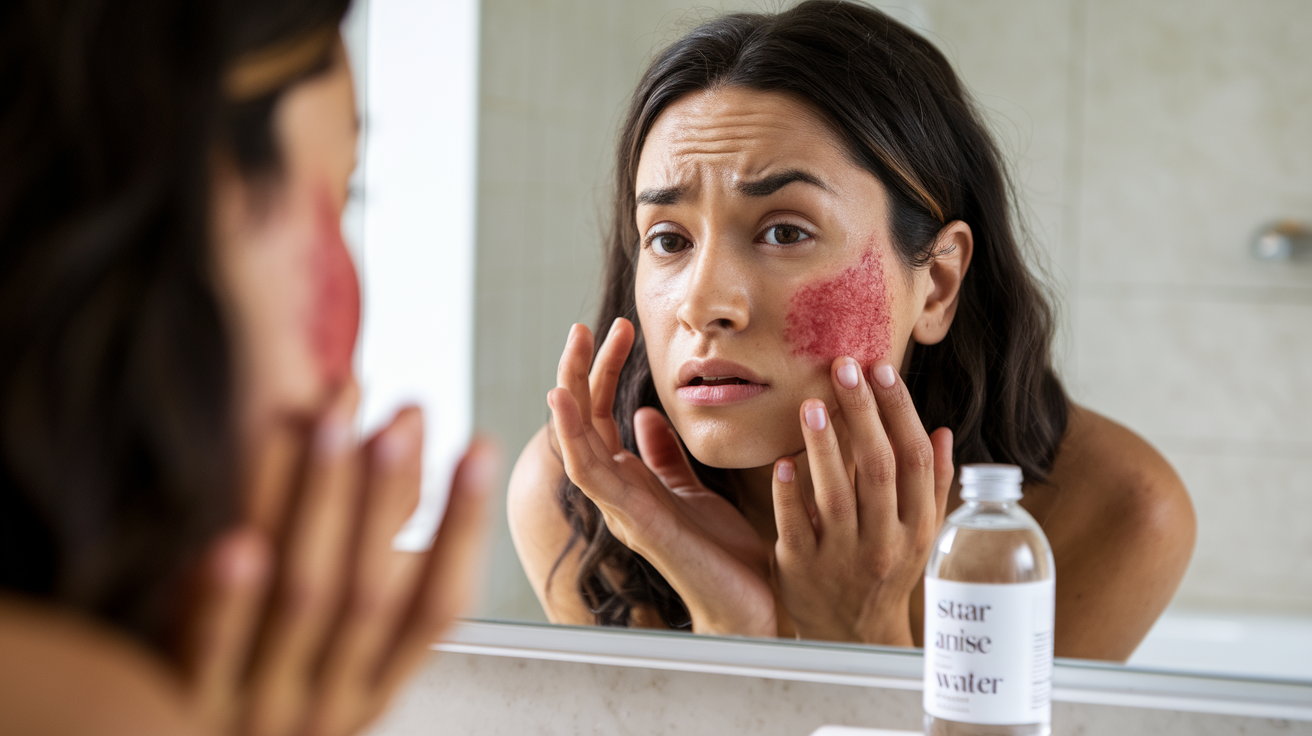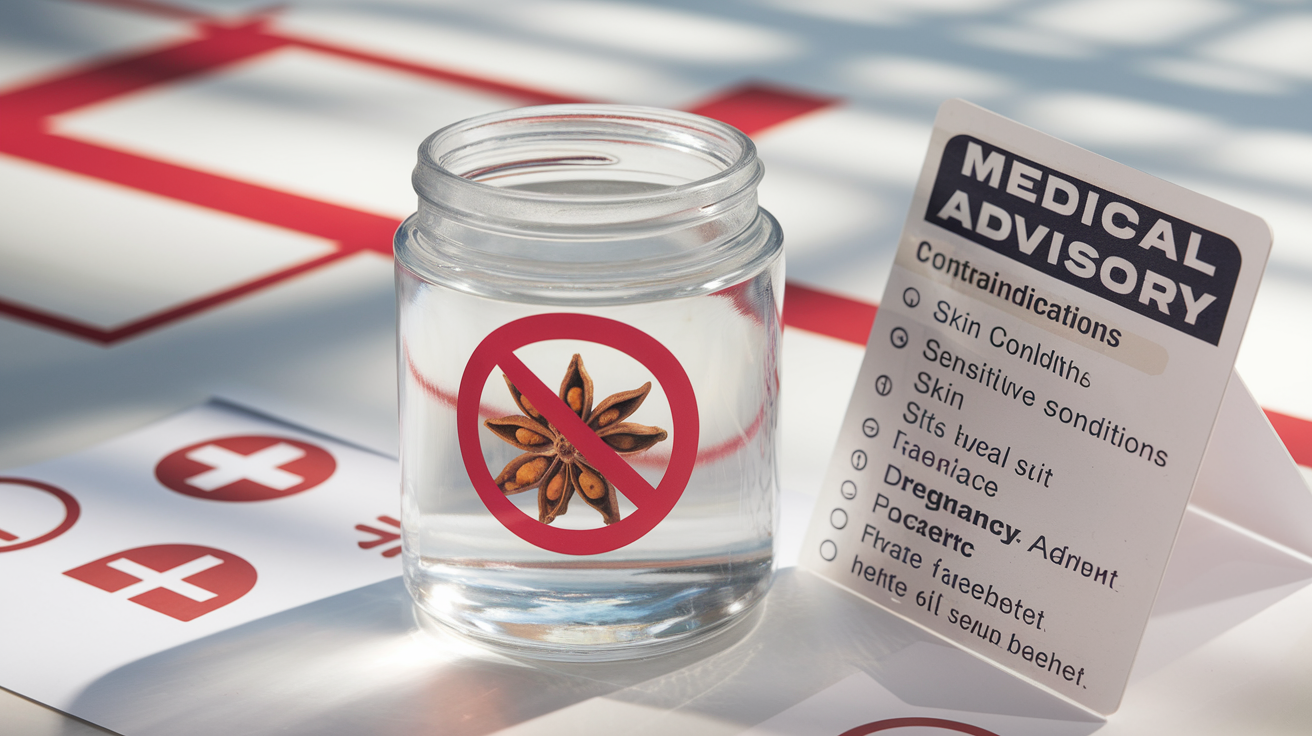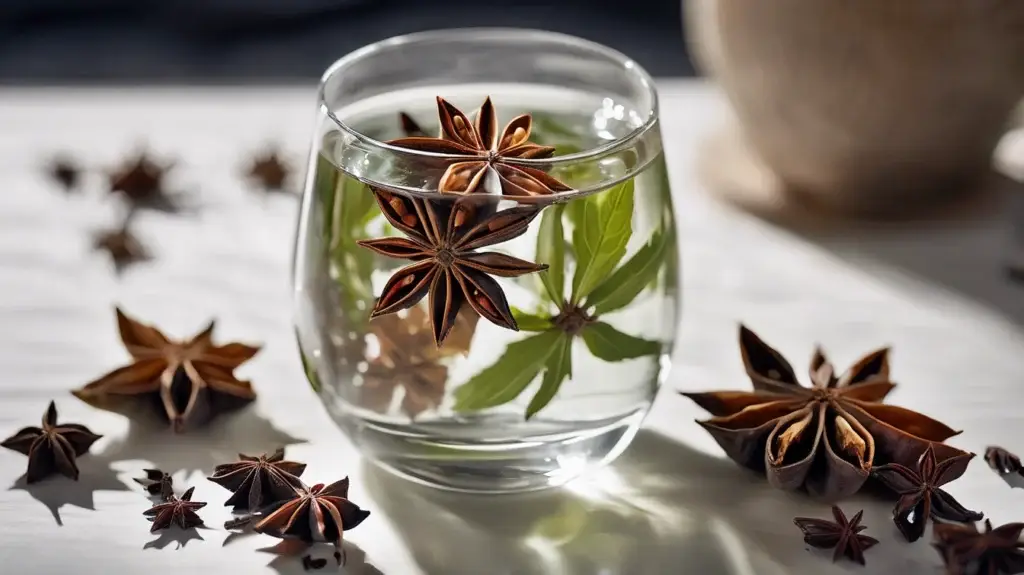Star anise water offers 6 natural ways to boost your skin’s glow, fight acne, and promote youthful, healthy skin.

Ever lay in bed scrolling through skincare products at midnight, wondering why everything either costs a fortune or contains ingredients you can’t pronounce? You’re not alone. The average woman applies over 168 chemicals to her face daily – most of them unnecessary.
Star anise water is nature’s best-kept skincare secret. This potent botanical extract delivers six remarkable benefits without the premium price tag or chemical overload.
I’ve spent years researching natural skincare alternatives after developing hypersensitivity to common beauty products. What I discovered about star anise water transformed not just my routine, but my skin’s entire health profile.
The real magic happens when you learn exactly how to prepare it – and trust me, most people get this crucial step completely wrong.
Health benefits

Preventing the flu
Star anise isn’t just great for your skin—it packs a serious punch against influenza viruses too. The secret? Shikimic acid, the same compound pharmaceutical companies use to make Tamiflu, one of the most effective anti-flu medications around.
When you brew star anise into a water preparation, you’re essentially creating a natural remedy that can help your body fight off flu symptoms. Many people drink star anise tea at the first sign of the sniffles, especially during flu season.
A cup or two daily can work wonders when you’re feeling under the weather. Unlike many synthetic alternatives, star anise water offers this protection without harsh chemicals touching your skin or entering your system.
Fighting fungal infections
Tired of dealing with stubborn fungal issues on your skin? Star anise water might be your new best friend. The natural antifungal properties in star anise can tackle everything from athlete’s foot to stubborn nail fungus.
For skin applications, you can create a stronger star anise solution and apply it directly to affected areas using a clean cotton pad. Regular application helps prevent the fungus from spreading while working to eliminate existing problems.
What’s particularly impressive is how star anise manages this without the burning sensation many commercial antifungal products cause. Your skin stays comfortable while healing—a win-win situation.
Eliminating bacterial infections
Bacterial skin infections don’t stand a chance against star anise water. The antimicrobial compounds in this spice disrupt bacterial cell walls, essentially stopping infections in their tracks.
You can create a gentle star anise wash for minor cuts, scrapes, or areas prone to bacterial buildup. The natural antibacterial properties help clean the area without harsh chemicals that might further irritate sensitive skin.
Many people notice that regular use helps prevent recurring bacterial skin issues, making star anise water an excellent addition to your preventative skincare routine.
Strengthening immunity
Your immune system is your body’s frontline defense—and star anise water gives it a serious boost. Rich in antioxidants like vitamins A and C, star anise helps neutralize free radicals before they can damage your skin cells.
This immunity boost translates directly to healthier skin that can better defend itself against environmental damage and pollutants. Regular consumption or topical application of star anise water helps maintain this protective barrier.
The antioxidant properties also mean fewer inflammatory responses, which often manifest as skin redness, irritation, or breakouts. Many people notice clearer skin within weeks of adding star anise to their health routine.
Eliminating and repelling insects
Bug bites driving you crazy? Star anise contains natural compounds that insects absolutely hate. Creating a diluted star anise water spray offers a chemical-free way to keep mosquitoes, ants, and other pests at bay.
For existing bites, the anti-inflammatory properties in star anise water can reduce swelling, redness, and that maddening itch. Simply dab the solution onto affected areas for quick relief.
This natural insect repellent is particularly valuable for those with sensitive skin who react poorly to commercial bug sprays. No chemicals, no problem!
Promoting digestion and treating gas
Good skin starts from within, and digestive health plays a huge role. Star anise water stimulates digestive enzymes, helping your body break down food more efficiently and absorb skin-nourishing nutrients.
The carminative properties in star anise also help relieve bloating and gas—uncomfortable conditions that can cause inflammation throughout your body, including your skin.
Drinking star anise water before or after meals helps maintain smooth digestive function, reducing the likelihood of stress-related skin flare-ups. It’s a simple addition to your routine with profound benefits for your skin’s overall health.
Difference between fennel and anise

The Truth About Fennel and Star Anise: Not the Same Plant at All
Listen, I’ve seen this mistake more times than I can count. People think fennel and star anise are basically twins or at least close cousins. They’re not.
They might share a similar licorice-like flavor, but they’re completely different plants with different benefits for your skin and health.
Origin and Plant Family Differences
Fennel comes from the Mediterranean region and belongs to the carrot family (Apiaceae). It’s that tall, feathery-leafed plant with yellow flowers that gives us those oval seeds.
Star anise? It’s from China and Vietnam and is part of the magnolia family (Illiciaceae). The star-shaped pods are completely different from fennel seeds – they’re actually fruits, not seeds at all.
Appearance: Easy to Tell Apart
| Feature | Star Anise | Fennel |
|---|---|---|
| Shape | Distinctive star-shaped pods | Oval or oblong seeds |
| Color | Rusty brown | Light or yellowish green |
| Size | 1-2 cm diameter stars | 4-9 mm length seeds |
One look and you’ll never confuse them again. Star anise looks exactly like its name – a pretty eight-pointed star. Fennel seeds look like, well, seeds.
Chemical Composition and Skin Benefits
Both contain anethole (that’s where the similar flavor comes from), but their other compounds differ significantly.
Star anise contains shikimic acid, which gives it powerful antiviral properties that fennel doesn’t share. For your skin, this means star anise water can help fight bacterial infections that cause acne.
Fennel seeds are higher in other compounds like fenchone and estragole. These give fennel slightly different properties – more focused on digestive benefits than the immune-boosting effects of star anise.
Using Them in Skin Care
When making skin toners, star anise water wins hands down. Its antifungal and antibacterial properties make it particularly effective for acne-prone skin. It’s also more potent, so you need less of it.
Fennel water can be gentler and works better for sensitive skin types. It has milder anti-inflammatory effects but doesn’t pack the same antimicrobial punch as star anise.
Remember though, if you’re pregnant or nursing, most experts recommend avoiding star anise in anything beyond food amounts. Fennel might be your safer bet in those cases.
Bottom line: don’t substitute one for the other in your skin care routines. Despite their similar flavor profiles, they’re totally different plants with unique benefits for your skin.
How to use

How to Use Star Anise Water for Skin
Ever wondered how to actually use this powerful botanical for your skin? It’s simpler than you might think. Star anise water can be incorporated into your skincare routine in several ways, but first, you need to know how to prepare it properly.
How to Make Star Anise Tea
Making star anise water (or tea) is incredibly straightforward, but getting it right makes all the difference for skin benefits.
What you’ll need:
- 3-4 whole star anise pods
- 2 cups of filtered water
- A small pot with lid
- Strainer
- Glass container for storage
Step-by-step preparation:
- Rinse the star anise pods under cool water to remove any dust or residue.
- Add the pods to your pot with the filtered water.
- Bring the water to a gentle boil, then immediately reduce to a simmer.
- Cover and let it steep for 15-20 minutes. The water will take on a golden-brown color and release that distinctive licorice-like aroma.
- Remove from heat and allow to cool completely.
- Strain the liquid to remove the pods and any fragments.
- Transfer to a clean glass container.
Your star anise water is now ready to use! It can be stored in the refrigerator for up to 5 days.
Pro tip: For a more potent solution for topical use, use 5-6 pods instead and reduce the water to 1 cup. Just remember that stronger isn’t always better for sensitive skin.
Ways to use your star anise tea for skin:
- As a facial toner: Transfer some to a spray bottle and mist onto clean skin morning and evening.
- In a facial steam: Pour warm (not hot) star anise water into a bowl and lean over it with a towel over your head for 5-10 minutes.
- Ice cube treatment: Freeze the tea in ice cube trays and rub over skin for a pore-tightening effect.
- Cotton pad application: Soak a cotton pad and gently press onto problem areas.
- Bath addition: Add a cup to your bathwater for a full-body treatment.
When applying star anise water to your face, always do a patch test first. The inner wrist is perfect for this – apply a small amount and wait 24 hours to check for any adverse reactions.
For maximum benefits, consistency is key. Most people see noticeable improvements in skin clarity and texture after 2-3 weeks of regular use.
Possible side effects

Common Side Effects of Star Anise
Look, star anise water can work wonders for your skin, but it’s not all sunshine and roses. Some people might experience reactions that make them question if this spice is right for them.
Skin irritation tops the list – especially if you’ve got sensitive skin. That tingling sensation? It might feel like it’s “working,” but it could actually be your skin saying “nope, not today.” Redness, itching, and even mild burning can happen when star anise comes in direct contact with your skin.
The strong licorice scent isn’t everyone’s cup of tea either. Some folks find it overwhelming or downright unpleasant. Nothing kills your skincare vibe faster than a scent you can’t stand.
Who Should Skip Star Anise?
Pregnant women need to be extra careful. While star anise tea is generally considered safe in small amounts, using concentrated star anise water on your skin during pregnancy isn’t well-studied. Why take the risk?
Got allergies to anise, fennel, or other plants in the Apiaceae family? Then star anise might trigger a reaction. Your body doesn’t care how trendy an ingredient is – if it’s programmed to fight it, you’ll know.
People on certain medications should chat with their doctor before jumping on the star anise bandwagon. It can interact with blood thinners, hormone therapies, and some antibiotics.
How to Test Before Full Application
Smart skincare lovers always patch test. Here’s the drill:
- Mix a small amount of diluted star anise water
- Apply to a tiny area on your inner forearm
- Cover with a bandage
- Wait 24 hours
- If no reaction occurs, you’re probably good to go
If your skin turns red, itchy, or feels uncomfortable – that’s your answer. Star anise isn’t your friend.
Proper Dilution is Key
Using pure star anise extract directly on skin? Big mistake. Huge. The concentrated oils can cause serious irritation or chemical burns.
Always dilute star anise water with other ingredients before application. Mix it with rosewater, witch hazel, or plain distilled water to reduce its potency while maintaining benefits.
For sensitive skin types, start with a 1:10 ratio (one part star anise water to ten parts base liquid), then gradually increase concentration if your skin responds well.
Remember – natural doesn’t automatically mean gentle or safe. Even plants pack powerful compounds that demand respect. Star anise has been used for centuries in traditional medicine, but that doesn’t mean it works for everyone’s skin.
Contraindications for use

Who Should Avoid Star Anise
Look, star anise water might be amazing for many people’s skin, but it’s definitely not for everyone. Some folks need to steer clear of this spicy little remedy.
Pregnant women should avoid star anise completely. Despite its skin benefits, this potent herb contains compounds that can stimulate the uterus and potentially cause complications during pregnancy. Not worth the risk, right?
People with sensitive skin or allergies need to tread carefully too. If you’re someone who breaks out in hives when a new laundry detergent touches your clothes, you’ll want to patch test star anise water before slathering it all over your face.
Common Allergic Reactions
If you’ve got allergies to plants in the Apiaceae family (think fennel, celery, carrots), you might cross-react with star anise. Signs you’re having a reaction include:
- Redness or irritation
- Itching or burning sensation
- Swelling or hives
- Excessive dryness or peeling
Medical Conditions That Don’t Mix Well
Got liver problems? Star anise contains anethole, which can affect liver function when used in high concentrations. Anyone with existing liver conditions should talk to their doctor first.
The same goes for people taking medication. Star anise can interact with certain drugs, especially:
- Blood thinners like warfarin
- Hormone therapies
- Some antibiotics
- Birth control pills
Even if you’re using it topically, some of those active compounds can still be absorbed through your skin and cause interactions.
Children and Star Anise
Kids have much more sensitive skin than adults. While diluted star anise water might be fine for mature skin, children’s delicate skin barrier makes them more susceptible to irritation.
Wait until they’re at least in their teens before introducing this particular natural remedy. There are plenty of gentler options out there for younger skin.
High-Concentration Risks
Store-bought essential oils of star anise are super concentrated and can cause serious irritation or chemical burns if applied directly. Even DIY star anise water can be too strong if you don’t dilute it properly.
The general rule? If your skin feels hot, tight, or uncomfortable after application, wash it off immediately and don’t use it again. Your skin is literally telling you “this isn’t for me.”
Remember, natural doesn’t automatically mean safe for everyone. What makes star anise water amazing for some people’s skin is exactly what makes it problematic for others. When in doubt, consult a dermatologist before starting any new skin treatment.

Growing your own star anise at home can transform your skincare routine in remarkable ways. From its anti-inflammatory properties to its ability to combat acne and reduce fine lines, this powerful herb offers a natural approach to maintaining healthy, radiant skin. Whether you prefer to use it as a facial toner, in bath soaks, or as a spot treatment, star anise water provides versatile options for enhancing your skin’s health.
Remember to start with small amounts when incorporating star anise into your skincare regimen, especially if you have sensitive skin or allergies. While this natural remedy offers numerous benefits, being mindful of potential side effects and contraindications ensures you can safely enjoy its skin-enhancing properties. Give star anise water a try and discover how this ancient herb can become a valuable addition to your natural beauty arsenal.


